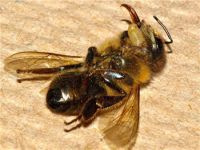
Bee decline: Disease or pesticides?

Until now many scientific experts have claimed that disease is the cause of the sharp decline in bee colonies. However, new research points the finger more and more at pesticides. Is mankind destroying the environment to a perilous degree, to the extent that smaller and smaller organisms are dying out?
This issue is raised in an article published on October 21 in Nature magazine (*), titled "The buzz about pesticides" written by Charlotte Stoddart. The article starts with the ominous warning "Bees, the most important pollinators of crops, are in trouble" because their population is dropping sharply round the globe.
Scientists postulate several theories for the decline of bees: parasites, such as the Varroa mite, pathogens (diseases), pesticides, declining foraging resources. The question is further complicated by a scarcity of real information, by the lack of far-reaching studies which assess impact on bees and not crops and humans. This shocking lack of information has seen British government ministers, for example, declare that while certain pesticides have not been tested for their effect on bees, they are perfectly safe to use. Safe for whom?
Indeed, when speaking about "bees" we are speaking about 20,000 species in nine families (discovered to date) and date on honey bees, for example, may be different from other data on bumblebees. However, more and more fingers point towards the combined effects of exposure to different types of pesticides, which would enable those connected with the production of one or another type to refute the evidence because analysing just one kind can produce ambiguous results.
For a scientist, an ambiguous result is a "no result". Couple with this the fact that there is a vast black hole in the area of research into the effects of pesticides on pathogens, mites and fungi and the bee decline story hits another hitch, always in favour of those who control and produce chemical products and always against the bee. Once again an absence of information protects those spraying crops with God alone knows what and does nothing to restore the colonies of bees.
The bottom line therefore has to be networking among environmentalists, sharing information and coming up with some plans before the world's bees die out completely and before we will be consuming synthetic honey made from chemicals.
Possible areas of research could investigate the effects of the neurotoxin Imidacloprid not only directly upon the insects themselves but also knock-on effects, increasing the pathogenic effects of fungi, other pesticides in the family of Neonicotinoids and their effects upon parasites or those which prey upon them and complete, far-reaching studies which investigate sub-lethal effects of pesticides and therefore open up a new panoply of possibilities to answer the question "What's all this buzz about bees?"
If bees die out, and everything indicates they are, just how far down the chain has mankind's destructive reach travelled? Are the negative effects of our "development" on the environment far worse than we imagined?
(*) Read the original article here:
http://www.nature.com/news/the-buzz-about-pesticides-1.11626
Timothy Bancroft-Hinchey
Pravda.Ru